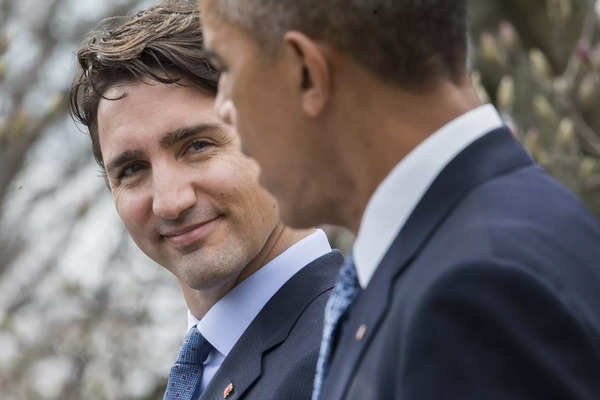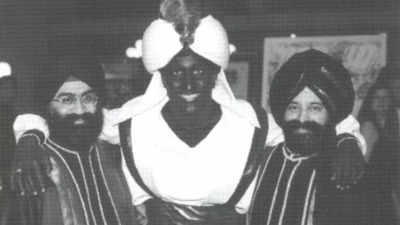From the darling of global liberalism to a cautionary tale for progressive politics, Justin Trudeau’s fall from grace has been as spectacular as his meteoric rise. Once hailed as the embodiment of inclusivity and modern leadership, the man who promised “sunny ways” now finds himself the butt of international jokes and the subject of mounting calls for his resignation. Trudeau’s tenure, defined by groundbreaking progressive initiatives and cringe-worthy controversies, has left Canadians—and the world—wondering how the prince of woke politics became a jester on the global stage.
A Manufactured Persona?
Critics often accused Trudeau of being a leader built for optics, a figure generated by a “woke Deus Ex Machina” designed solely to virtue signal. This sentiment resonated among those who saw his governance as more performative than substantive. From his frequent use of symbolic gestures—like painting his face black to express solidarity with minorities—to his penchant for delivering moralistic homilies, Trudeau became a polarising figure.
His focus on inclusivity sometimes turned into overcorrection. For instance, his emphasis on saying “LGBTQI2S” and other progressive utterances often clashed with real-world decisions that critics found inconsistent with his rhetoric.
The Controversy with India
A critical moment came in September 2023 when Trudeau accused the Indian government of orchestrating the murder of Hardeep Singh Nijjar, a controversial figure with alleged ties to Sikh extremism. Trudeau’s bold claims, made without presenting substantial evidence, enraged New Delhi and deepened diplomatic rifts. His actions were seen by some as a courageous stand for justice, while others criticised him for jeopardising Canada’s international relations. In fact, his rule-of-law statement became quite a joke on indian Twitter.
The Decline of Woke Politics

FILE — Canadian Prime Minister Justin Trudeau looks over at President Barack Obama during a joint news conference in the Rose Garden at the White House, in Washington, March 10, 2016. Trudeau gained global renown 10 years ago for his unabashedly progressive politics. But at home, voters turned sour on him long ago. (Zach Gibson/The New York Times)
The era of woke politics, which peaked during Trudeau’s rise, has since faced significant backlash. Many saw Trudeau as its last staunch defender. While Barack Obama’s presidency had ushered in a wave of progressive optimism, and Joe Biden’s tenure continued some of those ideals, Trudeau’s unwavering commitment to these values often placed him at odds with a world increasingly fatigued by ideological battles.
His detractors argue that his leadership style prioritised grandstanding over governance. They point to his focus on symbolic policies, like the “gender-neutral budget,” as evidence of a leader disconnected from practical realities. Even his handling of Indigenous issues, once a cornerstone of his platform, was criticised for failing to deliver tangible results.
Domestic Struggles
Trudeau’s leadership has been marred by ethics scandals, economic challenges, and increasing alienation from key voter bases.
- Ethics Scandals: The SNC-Lavalin affair and the WE Charity scandal severely damaged his credibility, with accusations of political interference and conflicts of interest. These controversies not only led to high-profile resignations but also eroded trust in his administration.
- Economic Issues: Rising inflation, an acute housing crisis, and a growing national debt exacerbated public dissatisfaction. While Trudeau welcomed immigrants to bolster Canada’s workforce, the infrastructure failed to keep pace, leading to skyrocketing rents and urban congestion.
- Indigenous Relations: While Trudeau spoke extensively about reconciliation with Indigenous communities, his actions often fell short. Pipeline approvals through Indigenous lands and delays in addressing clean water crises highlighted a gap between rhetoric and reality.
By 2024, even his party seemed to waver in its loyalty. High-profile resignations and calls for new leadership underscored the growing sentiment that Trudeau’s time had passed. His perceived elitism, coupled with a series of policy missteps, alienated him from the very voters who once propelled him to power.
Why Resignation Seems Imminent
- Internal Party Pressure: Many Liberal MPs have publicly or privately expressed the need for a leadership change, believing Trudeau is now a liability rather than an asset.
- Poll Numbers: The Liberal Party has consistently trailed the Conservatives under Pierre Poilievre in recent polls, with Trudeau’s approval ratings hitting historic lows.
- Global Isolation: His strained relationships with major powers, particularly India and China, have left Canada diplomatically vulnerable. The fallout from his accusations against India, in particular, has raised questions about his ability to navigate complex international dynamics.
- Public Perception: Trudeau’s image as a progressive champion has waned, replaced by perceptions of a leader out of touch with ordinary Canadians.
- Cultural Fatigue: Nearly a decade in power has led to leadership fatigue among Canadians, with many seeking a fresh direction.
Justin Trudeau’s unpopularity as Canada’s Prime Minister stems from a mix of political decisions, personal controversies, and public perception. Here are key factors that contributed to his decline:
Ethics Scandals
- SNC-Lavalin Affair (2019): Trudeau was accused of pressuring his then-Attorney General, Jody Wilson-Raybould, to intervene in a criminal case against SNC-Lavalin, a major engineering firm. This led to accusations of political interference and resulted in the resignation of two high-profile ministers.
- WE Charity Scandal (2020): His government awarded a lucrative contract to administer a student grant program to WE Charity, an organisation with close ties to his family. This raised questions about conflicts of interest and led to significant backlash.
Perceived Hypocrisy
Climate Change Policies vs. Oil Pipeline Support: Trudeau portrayed himself as a champion of the environment but faced criticism for purchasing the Trans Mountain Pipeline to support Canada’s oil sector, which alienated environmentalists.
Indigenous Reconciliation: Despite pledging to improve relations with Indigenous communities, actions like pipeline approvals on Indigenous lands and slow progress on clean drinking water for reserves were seen as contradictory.
Pandemic Policies
Trudeau’s handling of COVID-19 polarised Canadians. While some praised his leadership, others criticised prolonged lockdowns, vaccine mandates, and border restrictions. The invocation of the Emergencies Act during the 2022 “Freedom Convoy” protests further deepened divisions.
Economic Issues
- Rising Cost of Living: Under Trudeau’s leadership, Canada experienced inflationary pressures, particularly in housing and food costs. Critics pointed to government spending as a contributing factor.
- Debt Accumulation: Massive pandemic-related spending led to record federal deficits, sparking debates about long-term economic sustainability.
Personality Perceptions
Initially seen as charismatic and progressive, Trudeau’s image suffered from perceptions of elitism and insincerity. Critics accused him of performative politics, pointing to incidents like his controversial trip to India in 2018, which included dressing in traditional attire deemed excessive.
Fatigue with Leadership
After nearly a decade in power, some Canadians may simply be tired of Trudeau’s leadership. Long-serving leaders often face declining support as their policies and personalities become over-familiar.
Global and Regional Context
Canada’s fractured political landscape, regional alienation in Western provinces like Alberta, and global economic challenges have further eroded Trudeau’s appeal.
Despite the controversies, Trudeau’s legacy cannot be dismissed. He championed progressive values during a turbulent era, tackling issues like climate change, gender equality, and Indigenous reconciliation with unmatched fervour. But his perceived failures to deliver on these promises have overshadowed his initial optimism. Trudeau’s international persona—once seen as a counterweight to the global rise of populism—has become emblematic of the challenges facing progressive leaders in a polarised world. Critics argue his brand of politics is unsustainable in an era where ideological purity often clashes with practical governance. Whether remembered as a visionary or a divisive figure, Trudeau’s reign marks a pivotal chapter in Canadian politics. As the sun sets on his tenure, his departure will likely be framed as both a cautionary tale and an emblem of the challenges of leading in an ideologically divided world. His resignation, should it come, may serve as the final act of a leader whose vision inspired millions but ultimately faltered under the weight of its own contradictions.




